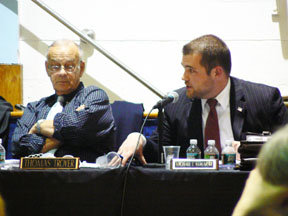It was meant to be a public hearing about the proposed budget for the 2011-2012 school year. But aside from the ongoing strife between the teachers’ union and school administrators, the only topic that Secaucus residents wanted to discuss at the March 24 school board meeting was an incident at a prior meeting, involving student Steven Kilawattie.
A Secaucus High School (SHS) sophomore, Junior State of America (JSA) member, and art enthusiast, Kilawattie has touched off a nerve within the school district and has sparked both an investigation and discussion within the school community.
In February, Kilawattie attended a public Secaucus Board of Education meeting and got up to speak during the portion reserved for the public to comment. As a member of the high school’s JSA, and the chapter’s liaison to the BOE, it was not Kilawattie’s first appearance before the board. He had in the past given school administrators and board members updates on JSA activities.
The Kilawattie family has asked that their son be given a formal apology.
________
Schools Superintendent Cynthia Randina later thanked Kilawattie for addressing the board, and his concern has led the BOE to explore the possibility of making changes to how some classes are weighted.
It’s what happened the day after the meeting that has led to controversy.
Now, Kilawattie’s parents are meeting with an attorney and want a public apology for what their son was made to do.
‘Defeated and disengaged’
“The following day there were some consequences where he was asked to write an apology letter,” said Steven’s father, addressing the BOE on March 24. “This was a public venue. We all have the right to express what we think…and to make our point clear. What occurred [the day after the February meeting] was wrong. It was absolutely wrong for someone to ask him to write an apology for being here, not only for himself, but for his peers, the students of Secaucus.”
According to the elder Kilawattie, his son was forced to appear before “three adult authority figures” the day after he spoke out about the art credits. Several of his teachers were also called into meetings and asked whether they had encouraged him to express this concern.
A member of the Secaucus Education Association, the local teachers’ union, said the meetings with Kilawattie and teachers had a punitive feel to them.
“The greatest disappointment in all of this is how this student has learned a lesson that has been taught to him,” said Kilawattie’s father. “This student, who has never been a discipline problem, has participated in extracurricular activities, was a vocal peer [leader] who had the drive and desire to continue his education, now appears defeated and disengaged from the learning environment.”
At least three of Steven Kilawattie’s teachers – including popular esteemed art teacher Doug DePice and JSA advisor and social studies teacher Michael Gehm – confirmed at the March 24 public meeting that the apparent reprimand Kilawattie received for speaking out in February has deeply affected the formerly outgoing sophomore.
While no one will publicly say who demanded that young Kilawattie write the letter, some are saying it was the high school principal, Dr. Robert Berckes, while others say that it was really the superintendent who pushed the principal to make the demand.
Students asking questions
According to Gehm, Kilawattie isn’t the only student who is now “confused” about the takeaway message from this experience.
“Students are frustrated. They feel like they aren’t sure if they should or should not speak at a board meeting,” said Gehm. “Are there going to be ramifications if they speak at a public meeting? That was my concern when I spoke at the board meeting [on the 24th]. I wanted clarification on how to direct the students…There is now a debate of whether a minor can speak at a board meeting.”
A major tenant of JSA, said Gehm, is that young people should learn to become “civically involved in their communities, in their schools, and in national politics.”
At the March 24 meeting, members of the Board of Education said they were unaware that Kilawattie had been forced to write a letter after his February appearance before the trustees. One board member, Michael Makarski, immediately asked that an investigation be launched into the matter.
Randina stated that the board’s attorney has already launched an investigation.
In addition, at the March 24 meeting, several community members – one even close to tears – expressed support for Kilawattie and said they were concerned about how he had been treated by school administrators.
Adam Mustafa, the 2007 SHS valedictorian who is currently pursuing an engineering degree at the Massachusetts Institute of Technology (MIT), noted that MIT requires that students – even those studying the hard sciences – take “a full 25 percent of our course load in the humanities.” The university, he said, puts a large emphasis on the arts, “but our high school does not. I can guarantee that there are many who will never use physics. But it would be hard to find someone who doesn’t have the opportunity to express themselves through communication or writing. I feel bad for those who have never experienced the joy of reading, dancing, or just painting.”
When asked for a response the controversy last week, Randina said through a spokesman: “The student-related issue brought up at the March 24th BOE meeting is something we cannot respond to at this time other than to say that it is being investigated by the administration and board attorney, and will be concluded shortly. My directive…was that the administration should investigate the matter. No letter of apology was requested. I commended the student for presenting his concerns at the public meetings.”
The Kilawattie family, who has met at least once with Randina, is asking that their son be given a formal apology by school administrators.
E-mail E. Assata Wright at awright@hudsonreporter.com.
